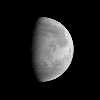

Click on image for full resolution version
Mars Global Surveyor Mars Orbiter Camera Release: MOC2-3
Mars Global Surveyor Mars Orbiter Camera Image ID: 556524446.41
Caption
The Mars Orbiter Camera (MOC) took this image on August 20, 1997,
when the Mars Global Surveyor (MGS) was 5.67 million kilometers (3.52
million miles) and 22 days from entering orbit. At this distance, the
MOC's resolution is about 21.2 km per picture element, and the 6800 km
(4200 mile) diameter planet is about 327 pixels across. North is at
the top of the image. The MGS spacecraft pointed the camera at the
center of the planet (near the dark, morning sunrise line, or
terminator) at 23.6° N, 82.1° W. At this distance
from Mars, only bright and dark markings resulting from variations in
the amount and thickness of dust and sand are visible. The large dark
marking stretching from the right center northward is Acidalia
Planitia, a region of rock and sand with less dust on it than the area
immediately to the south, Chryse Planitia. Both Viking Lander 1 and
Pathfinder landed in the latter, bright area. In this low resolution
image, some of the dark features resemble the "canals" seen
prominently in maps created by astronomers of the 19th and early 20th
century. Mariner 9 and Viking images show that most of these dark
lines are associated with sand deposits that are trapped in rough
areas.
Mars Global Surveyor was launched on November 7, 1996 and will enter
Mars orbit on Thursday, September 11 around 6:30 PM PDT. The
spacecraft will use atmospheric drag to reduce the size of its orbit.
Mapping operations will begin in March 1998.
The MOC on MGS is a spare camera originally developed for the
ill-fated Mars Observer mission. Malin Space Science Systems and the
California Institute of Technology were responsible for development of
both cameras. MSSS operates the MOC from its facilities in San Diego,
CA, under contract to the Jet Propulsion Laboratory


